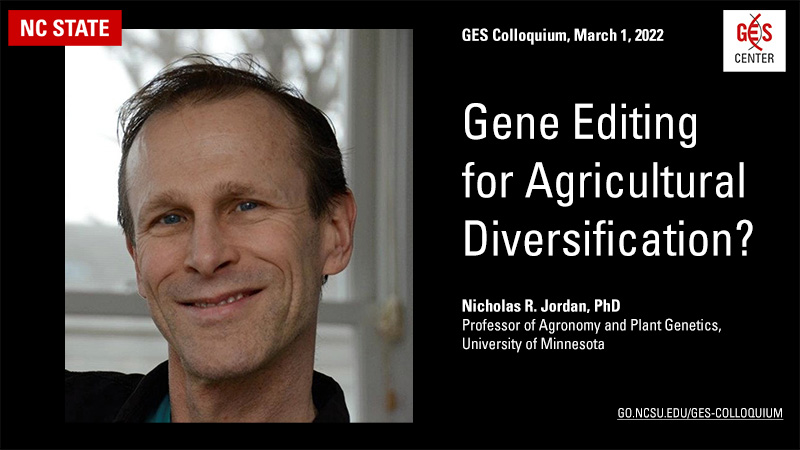
- This event has passed.
Nicholas Jordan – Gene Editing for Agricultural Diversification? | GES Colloquium

Colloquium Home | Zoom Registration | GES Video Library (current) | Video Archives | Podcast | @GESCenterNCSU | Newsletter
Gene editing for agricultural diversification:
Insights from a cooperative governance project
Nicholas R. Jordan, PhD, Professor of Agronomy and Plant Genetics, University of Minnesota
Gene editing as a tool for agricultural diversification: perspectives from a multi-sector deliberative group.
Abstract
Agricultural diversification is widely seen as a critical element of future agricultural development development. One important concept of diversification is continuous-living-cover (CLC) agriculture, which integrates multiple crops to create diversified agroecosystems in which soils are covered by living plants across time and space continuously. Compared to agroecosystems that provide more limited cover of soil, CLC agriculture can greatly improve production of many ecosystem services from agroecosystems. To go to scale, CLC agriculture requires crops that not only provide continuous living cover but are viable in economic and social terms.
At present, lack of such crops is strongly limiting the scaling of CLC agriculture. Gene editing (GE) might provide a powerful tool for developing the crops needed to expand CLC agriculture to scale. To assess this possibility, a multi-sector deliberative group deliberated the merits of GE—relative to alternative plant-breeding methods—as means for improving crops for CLC agriculture. The group included many of the sectors whose support is necessary to scaling agricultural innovations, including actors involved in markets, finance, policy, and R&D. Views of participants were expressed in interviews and deliberative workshops.
Many in the group were enthusiastic about prospects for applications of GE to develop crops for CLC agriculture, relative to alternative plant-breeding options. However, the group noted many issues, risks, and contingencies, all of which are likely to require responsive and adaptive management. Conversely, if these issues, risks, and contingencies cannot be managed, it appears unlikely that a strong multi-sector base of support can be sustained for such applications, limiting their scaling. Emerging methods for responsible innovation and scaling have potential to manage these issues, risks, and contingencies; we propose that outcomes from GE crops for CLC agriculture are likely to be much improved if these emerging methods are used to govern such projects.
Speaker Bio
Dr. Nick Jordan is a Professor of Agronomy & Plant Genetics, at the University of Minnesota, St. Paul. His research, teaching, and engagement work seeks pathways to diversification in the agriculture of the US Midwest. He co-directs the Forever Green Partnership, which is developing and commercializing a portfolio of new and repurposed crops for diversification of Midwest agriculture.
GES Colloquium is jointly taught by Drs. Jen Baltzegar and Sumit Dhole, who you may contact with any class-specific questions. As conditions allow, colloquium will be held in-person in Poe 202, as well as live-streamed via Zoom (at least January will be 100% virtual). Please subscribe to the GES newsletter and Twitter for updates .
WordPress database error: [Unknown column 'wp_tec_occurrences.start_date' in 'SELECT']SELECT SQL_CALC_FOUND_ROWS wp_posts.*, CAST( wp_tec_occurrences.start_date AS DATETIME ) AS event_date
FROM wp_posts LEFT JOIN wp_term_relationships ON (wp_posts.ID = wp_term_relationships.object_id) LEFT JOIN wp_postmeta ON ( wp_posts.ID = wp_postmeta.post_id AND wp_postmeta.meta_key = '_EventHideFromUpcoming' ) LEFT JOIN wp_postmeta AS mt1 ON ( wp_posts.ID = mt1.post_id )
WHERE 1=1 AND wp_posts.ID NOT IN (16992) AND (
wp_term_relationships.term_taxonomy_id IN (149,521,802)
OR
wp_term_relationships.term_taxonomy_id IN (45,47)
) AND (
wp_postmeta.post_id IS NULL
AND
( mt1.meta_key = '_EventStartDate' AND CAST(mt1.meta_value AS DATETIME) >= '2026-01-12 18:21:46' )
) AND wp_posts.post_type IN ('post', 'page', 'attachment', 'tribe_venue', 'tribe_events', 'tribe_event_series') AND ((wp_posts.post_status = 'publish'))
GROUP BY wp_tec_occurrences.occurrence_id
ORDER BY event_date ASC, wp_posts.post_date ASC
LIMIT 0, 3